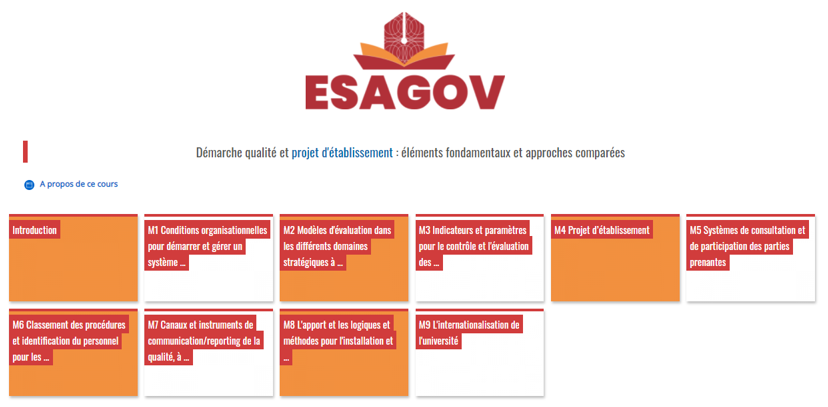
Following the preparatory online training webinars held in autumn 2020, a new stage in Work Package 3 of the ESAGOV project has just been concluded.
Since April 8th, the online course “Démarche qualité et projet d’établissement: éléments fondamentaux et approches comparées” has been available to Algerian universities on UNIMED’s MOODLE platform.
The course is structured around a general introduction and 9 training modules:
- Organizational conditions for starting up and managing an effective system of governance through the quality approach
- Evaluation models in the various strategic areas to be governed, to be implemented in universities with examples of evaluation processes
- Indicators and parameters for monitoring and evaluating activities and services related to each strategic area
- Establishment project
- Stakeholder consultation and participation systems
- Classification of procedures and identification of staff for accreditation and assessment processes
- Channels and instruments for quality communication/reporting, inside and outside the university
- Input, logic and methods for installing and powering performance measurement and evaluation systems with integrated logic
- The internationalization of the university
For each module, the Universities of Cà Foscari-Venice, Pavia, Paris 1-Sorbonne and Rouen-Normandie have provided a basic manual presenting the key theoretical concepts of each theme, together with in-depth material (bibliographical references, additional resources, video pills produced for the course).
Participants were also able to take part in quizzes, so as to self-assess the notions acquired in each module.
In addition, each participant completed a logbook structured around the following questions:
- Name 3 concepts/principles/actions that are particularly important to you after this session
- Based on what you have learned from this module, what practice would you consider useful and adaptable to the Algerian context?
- Is there a concept/notion that remains unclear and needs to be explored further?
The answers provided in the logbook put the basis for the question-and-answer session with European partners, which took place online on June 9th. On this occasion, course participants had the opportunity to exchange views with experts from European universities, in order to deepen their understanding of the course content and clarify certain points/doubts.
